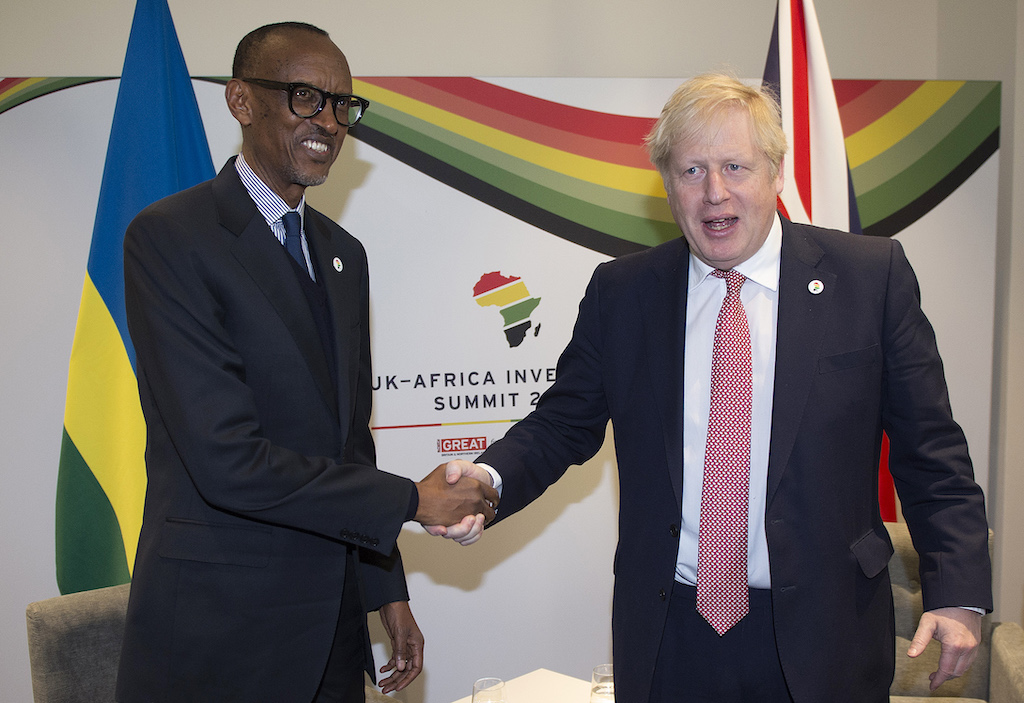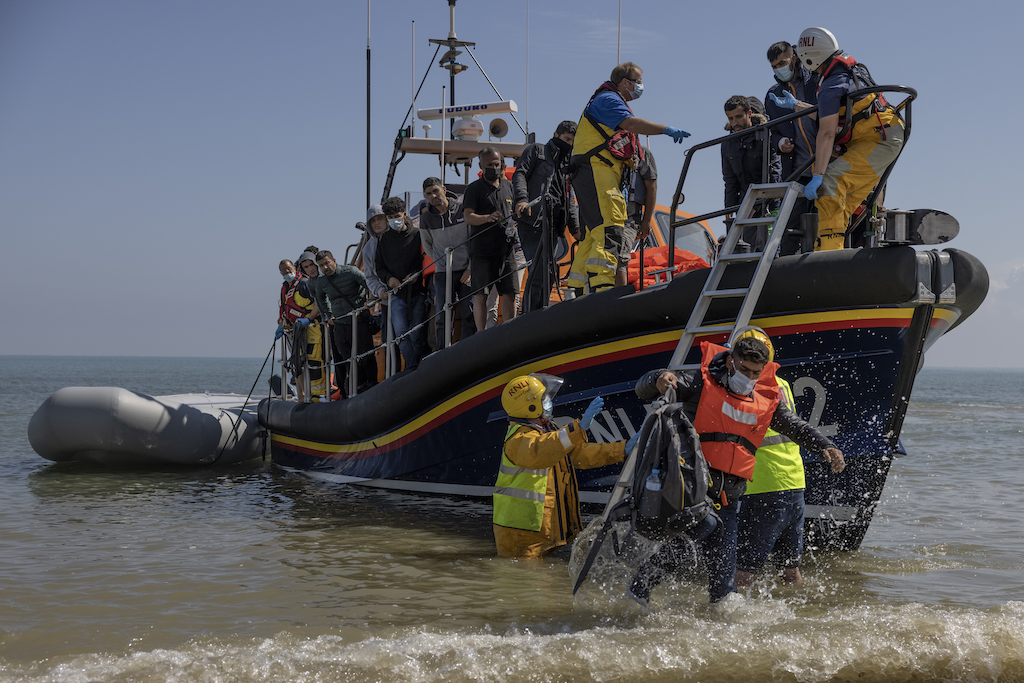The UK-Rwanda deal: Risky attempt to curb illegal immigration
The UK’s plan for farming out the management of illegal immigrants faces stiff challenges but is part of a larger trend.

In a nutshell
- The UK-Rwanda deal was prompted by the rising wave of illegal immigration
- The government seeks to deport “irregular” immigrants to Rwanda
- The scheme has met with adverse publicity and legal opposition in the UK
Under the Asylum Partnership Agreement (APA) signed in April 2022 by the United Kingdom and Rwanda governments, asylum seekers arriving in the UK illegally may be transferred to Rwanda, which will process the claims. If the asylum is granted, under the UK-Rwanda deal migrants will be encouraged to stay in the African country for at least five years.
The externalization of migration and asylum is not new. Australia has implemented such policies since the 1990s. Spain externalized its borders during the Cayucos boat crisis in 2006 when Mauritania and Senegal allowed Spanish patrols to monitor their coastline. In 2015, amid what was defined as Europe’s “refugee crisis,” the European Union entrusted Turkey with control and management of migration and refugee flows (the EU-Turkey Statement).
However, while not breaking new ground, the UK-Rwanda deal already has unleashed legal and political battles. The outcomes will influence migration policies in Europe and beyond.
Strategy of deterrence
According to official data, there were 35,000 “irregular” entries into the UK in 2021, the vast majority (28,526) by boat. (Others arrived by air on false documents and stowed away in lorries and containers.) The year before, the number of such immigrants was estimated at 8,404; in 2019, it was under 2,000.
The origin countries of asylum seekers generate many stress factors that prompt people to flee and venture into long and dangerous journeys. These factors range from the brutality of the conflicts in Yemen and Syria to authoritarianism and poverty in Eritrea, diffuse violence and absence of economic prospects in Chad, unemployment in Egypt or a combination of all these factors, as found in countries like Sudan.
For the British government, the alarming increase in irregular arrivals is a stinging political problem. Taking back control of the borders was one of the key promises of Brexit campaigners. The APA deal is also a Brexit product to the extent that it is part of a broader restructuring of the British refugee and asylum law that was not possible when the UK was in the European Union.
The case focuses on the difficulties a non-African asylum seeker would encounter in integrating himself into a country like Rwanda.
However, the solution chosen by the Conservative government to address this political and economic issue is bound to invite legal and diplomatic challenges. The United Nations High Commissioner for Refugees (UNHCR) and several civil society associations have already accused the UK of disrespecting the International Refugee Convention by stripping asylum claimers of their right to choose the country where they seek refuge. Particularly, British Home Secretary Priti Patel has found herself under heavy flak from charities focused on migration and refugees in the UK.

Acting on behalf of an Iranian asylum seeker, InstaLaw Solicitors has launched legal action against this policy, claiming it runs afoul of international law, the UN refugee convention, and the British data protection law. The case, however, focuses mainly on the difficulties a non-African asylum seeker would encounter in integrating himself into a country like Rwanda.
The leverage of gatekeepers
The status of a refugee-hosting country usually brings strategic benefits, from aid inflows to diplomatic advantages. Rwanda is not the region’s first country to embrace such a strategy.
Hosting 1.5 million refugees, Uganda is the world’s third-largest host of refugees and the first in Africa. The government received much praise for its “self-reliance” policy toward refugees who are granted freedom of movement and the right to work. But the strategy is a double-edged sword: while Uganda’s economy has benefited from the presence of refugees, including through the increase in development aid flows, tensions between refugees and host communities have been rising in recent years.
In the case of Rwanda, the most immediate benefit is the payment of GBP 120 million destined for the country’s economic development. The UK will also assume the operational costs of the program. However, there are other significant advantages.
Its remarkable economic and developmental progress notwithstanding, Rwanda remains dependent on foreign assistance, and Kigali seeks to reduce that dependency. Moreover, despite successful aid management, the Rwandan government has been criticized for its democratic deficits. Securing access to additional funding while consolidating its position as a trustworthy partner of the West is an attractive proposition for Rwanda. Acting as a partner in managing international migration and refugee flows is now part of the country’s strategy; Kigali has already signed a similar agreement with Israel and has been holding conversations with Denmark.
There is another political and diplomatic advantage that Rwanda may be willing to explore. President Paul Kagame has recently suggested that, besides sending migrants, the UK should also extradite suspects of genocide who remain in British territory. Prosecuting genocide suspects has been a priority of the governments of the Rwandan Patriotic Front since the group seized power in 1994. Rwanda’s extradition requests have created diplomatic tensions with several countries.
The migration dilemma
The recent decades have seen a dynamic of hyper-globalization that resulted from – and contributed to – significant reductions in the costs of moving goods, ideas, and people. This development, in turn, has reinforced the ideals of hospitality and cosmopolitanism attributed to the German philosopher Immanuel Kant (1724-1804). At the same time, in the increasingly interconnected world where tensions proliferate, there is increasing pressure to broaden the definition of a refugee. Many argue it should cover not only those escaping direct war or political persecution but also other existential threats, such as environmental crisis or chronic poverty.
However, as the economic gap between the Global North and the Global South keeps migratory pressure high, the problem of legal and “irregular” immigration has become a driver of political radicalization across several European countries. Consequently, policymakers have been seeking new, pragmatic approaches. These include offshoring the management of asylum requests and, generally, of illegal migration flows.
While the UK is no longer a member of the European Union, the legal straitjacket remains.
In this context, the deal between the UK and Rwanda – two countries that sit 4,000 miles away – could become a source of inspiration for other states struggling with rising migratory pressures. These solutions, in turn, increase the diplomatic leverage of partner and host countries like Turkey, Morocco and Rwanda.
It is important to note, however, that Frontex – the agency in charge of implementing the EU border management policies – already resorts to externalization processes, having established several agreements with origin and transit countries, from Albania to Turkey and Niger. The recent announcement that Frontex would dispatch guards and drones to Senegal under a cooperation arrangement has prompted renewed criticism from activists and NGOs.
Scenarios
The APA deal could be a win-win situation for both countries if successfully implemented. However, a combination of factors and signs suggests that the potential for success is limited.
In this context, two scenarios deserve consideration.
Why it may fail
Under the first, most likely scenario, the deal will not help decrease the number of asylum seekers in the UK significantly. Walls, border controls and offshoring measures usually do not work as a dissuasion mechanism. Thus far, with the London-Kigali deal already in place, the number of people crossing the channel continues to creep up.
A second factor that will work against the initiative is legal consequences. While the UK is no longer a member of the EU, the legal straitjacket remains. It will be difficult – legally and politically – to ignore the “safe third country principle,” particularly considering Rwanda’s patchy human rights record.
According to this principle, member states can send applicants to a third country only if the applicant has a connection to that country, if there remains the possibility to request refugee status, and if granted, to receive protection per the 1951 Refugee Convention and its 1967 Protocol. (UNHCR serves as the guardian of this convention.)
Moreover, it must be guaranteed that the applicant will not face persecution or treatment that violates Article 3 of the European Convention on Human Rights. Under international law, the principle of non-refoulment states that no one should be returned to a country where they would face irreparable harm. In addition, international law prevents the UK from sending to Rwanda unaccompanied children, people of vulnerable groups and those who have family members residing in the country.
While the UK’s policy is ineffective in containing migration, London will likely face increasing contestation from domestic and international activists and human rights organizations.
A possible precedent
The APA deal would prove mutually advantageous under a second, slightly less likely scenario. It would reduce the migratory pressure and its political consequences in the UK while reinforcing Rwanda’s leverage on the international sphere without compromising domestic stability.
As Prime Minister Boris Johnson suggested, APA could become an important precedent when Denmark is also discussing with Rwanda a similar agreement after the Danish parliament approved a new asylum law proposed by the Social Democrats. Like the UK, Denmark has safeguarded its sovereignty on the matter through an opt-out from the EU migrant and asylum policy.
While the second scenario seems to be less likely for now, things could change soon. If migratory pressure increased again – which cannot be excluded given the ongoing war, rising food prices and multiple drivers of instability in origin countries – European countries, despite rhetorical exercises, would find it hard to resist such externalization mechanisms. As political, diplomatic, and legal obstacles diminished, developed countries could implement such measures in ways that would effectively discourage migrants and asylum seekers.
From a geopolitical perspective, this scenario would have significant consequences. As observed in the cases of Turkey and Morocco, buffer states significantly increase their diplomatic leverage, securing access to multiple benefits in the international arena, including financial benefits and tolerance of their democratic deficits.
However, this could also bring destabilization to host countries. In the medium-to-long term, this would likely be the case in Rwanda, a small and densely populated country where land is a scarce resource and with a recent past dramatically marked by ethnic tensions. Whereas the government has attained remarkable economic and developmental gains, a progressive increase in the number of refugees could trigger destabilization.






